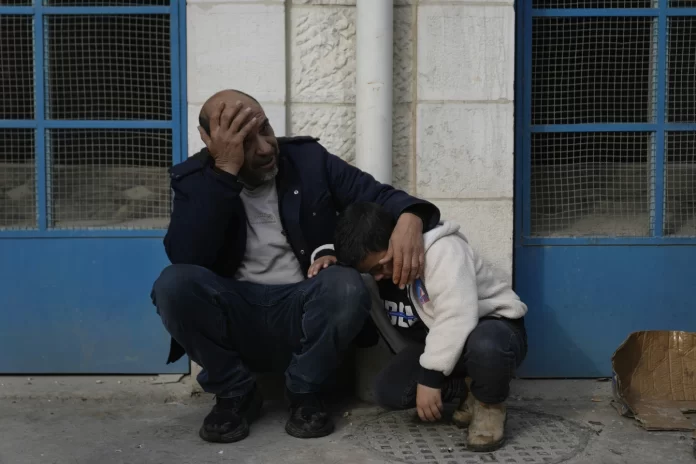(AP) — Prime Minister Benjamin Netanyahu said Thursday that a last-minute dispute with Hamas was holding up Israeli approval of a long-awaited ceasefire that would pause the fighting in the Gaza Strip and release dozens of hostages. Israeli airstrikes, meanwhile, killed at least 72 people in the war-ravaged territory.
The delay raised concerns about the implementation of the deal, scheduled to go into effect on Sunday, shortly after U.S. President Joe Biden and key mediator Qatar announced it was complete.
That created a dual reality: War-weary Palestinians in Gaza, the relatives of hostages held in the enclave and world leaders all welcomed the result of months of painstaking diplomacy, even as Netanyahu said it was not yet finalized.
“Hamas is backing out of the understandings and creating a last-minute crisis that prevents a settlement,” Netanyahu’s office said. It was not immediately clear if the deal was in jeopardy, or whether Netanyahu’s statement merely reflected jockeying to keep his fractious coalition together.
Although the Israeli Cabinet had been set to vote on the deal Thursday, Netanyahu’s office said it would not convene until Hamas backs down, accusing the Palestinian militant group of reneging on parts of the agreement in an attempt to gain further concessions — without specifying which parts.
In a briefing Thursday, David Mencer, an Israeli government spokesman, said Hamas’ new demands dealt with the deployment of Israeli forces in the Philadelphi corridor, the narrow strip that borders Egypt and which Israeli troops seized in May.
Mencer said Netanyahu “strongly insisted” late Wednesday that Hamas drop its 11th-hour request. An Israeli troop presence in the sensitive zone, long one of the main sticking points in negotiations, was “crucial to stop weapons smuggling” he said.
“We hope that the details will be finalized,” he said.
Netanyahu faces heavy internal pressure
The Israeli prime minister faces great domestic pressure to bring home the hostages but resistance from his far-right coalition partners, who have threatened to bring down his government if he makes too many concessions.
Netanyahu has enough opposition support to approve an agreement without those partners, but doing so would weaken his coalition.
His hardline allies who hold key positions in the government, National Security Minister Itamar Ben-Gvir and Finance Minister Bezalel Smotrich, have already denounced the current deal as “terrible” and “dangerous,” respectively.
The departure of both of their factions could bring down the government and lead to early elections.
A phased withdrawal and hostage release with potential pitfalls
Under the deal reached Wednesday, 33 of some 100 hostages who remain in Gaza are set to be released over the next six weeks in exchange for hundreds of Palestinians imprisoned by Israel. Israeli forces will pull back from many areas, hundreds of thousands of Palestinians would be able to return to what’s left of their homes, and there would be a surge of humanitarian assistance.
The remainder of the hostages, including male soldiers, are to be released in a second — and much more difficult — phase that will be negotiated during the first. Hamas has said it will not release the remaining captives without a lasting ceasefire and a full Israeli withdrawal, while Israel has vowed to keep fighting until it dismantles the group and to maintain open-ended security control over the territory.
Ceasefire leaves questions about Gaza’s future unanswered
U.S. President-elect Donald Trump’s Mideast envoy joined the talks in the final weeks, and both the outgoing administration and Trump’s team are taking credit for the breakthrough.
Longer-term questions about postwar Gaza remain, including who will rule the territory or oversee the daunting task of reconstruction.
Israel has come under heavy international criticism, including from its closest ally, the United States, over the civilian toll in Gaza. It also blames Hamas for the civilian casualties, accusing it of using schools, hospitals and residential areas for military purposes.
Hamas, a militant group that does not accept Israel’s existence, has come under overwhelming pressure from Israel’s invasion of Gaza’s largest cities and towns and seizure of the border between Gaza and Egypt. Its top leaders, including Yahya Sinwar, who was believed to have helped mastermind the Oct. 7, 2023, attack, have been killed.
But its fighters have regrouped in some of the hardest-hit areas after the withdrawal of Israeli forces, raising the prospect of a prolonged insurgency if the war continues.








